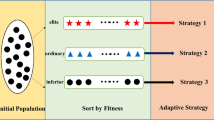Abstract
Since it was first presented, particle swarm optimization (PSO) has experienced numerous improvements as a traditional optimization approach. PSO becomes more complex as a result of the majority of improvement strategies, which use learning model replacement or parameter adjustment to enhance PSO’s performance. Based on linear system theory, this study proposes a simple and scalable framework for restructuring particle swarm optimization (RPSO) and provides a new example of the RPSO algorithm framework, Q-RPSO. The RPSO framework adopts a single position updating formula instead of the original position and velocity updating formulas, which are unrelated to the PSO’s velocity and the current position. The experiments were carried out to compare with the standard PSO and six PSO variants based on CEC 2013 benchmark functions. The experimental results demonstrate that, whether in terms of global exploration capability or convergence accuracy, Q-RPSO outperforms all competitor algorithms.






Similar content being viewed by others
References
Kennedy J, Eberhart R (1995) Particle swarm optimization. Icnn95-Int Conf Neural Netw 4:1942–1948
Kadirkamanathan V, Selvarajah K, Fleming PJ (2006) Stability analysis of the particle dynamics in particle swarm optimizer. IEEE Trans Evol Comput 10(3):245–255
Kennedy J (1999) Small worlds and mega-minds: Effects of neighborhood topology on particle swarm performance. In: Proceedings of IEEE congress on evolutionary computation, CEC’99, Washington DC, USA, pp. 1931–1938
Shi Y, Eberhart R (1998) A modified particle swarm optimizer. In: 1998 IEEE international conference on evolutionary computation proceedings. IEEE World Congress on Computational Intelligence (Cat. No.98TH8360), Anchorage, AK, USA, pp. 69–73
Ratnaweera A, Halgamuge S, Watson H (2004) Self-organizing hierarchical particle swarm optimizer with time-varying acceleration coefficients. IEEETrans Evol Comput 8(3):240–255
Zhan Z, Zhan J, Li Y et al (2008) Adaptive particle swarm optimization. Ant colony optimization and swarm intelligence. Springer, Berlin, pp 227–234
Mao K, Bao G, Chi X (2010) Particle swarm optimization algorithm based on non-symmetric learning factor adjusting. Comput Eng 36(19):182–184
Tao X, Li X, Chen W et al (2021) Self-Adaptive two roles hybrid learning strategies-based particle swarm optimization. Inf Sci 578:457–481
Leong W, Yen G (2006) Dynamic population size in PSO-based multiobjective optimization. In: 2006 IEEE international conference on evolutionary computation, Vancouver, BC, Canada, 2006, pp 1718–1725. https://doi.org/10.1109/CEC.2006.1688515
Chen D, Zhao C (2009) Particle swarm optimization with adaptive population size and its application. Appl Soft Comput 9(1):39–48
Wei B, Xia X, Yu F et al (2020) Multiple adaptive strategies based particle swarm optimization algorithm. Swarm Evol Comput 57:100731
Li X, Mao K, Lin F et al (2021) Particle swarm optimization with state-based adaptive velocity limitstrategy. Neurocomputing 447:64–79
Ren M, Huang X, Zhu X et al (2020) Optimized pso algorithm based on the simplicial algorithm of fixed point theory. Appl Intell 50(7):2009–2024
Mendes R, Kennedy J, Neves J (2004) The fully informed particle swarm: simpler, maybe better. IEEE Trans Evol Comput 8(3):204–210
Liang J, Qin A, Suganthan P et al (2006) Comprehensive learning particle swarm optimizer for global optimization of multimodal functions. IEEE Trans Evol Comput 10(3):281–295
Liang J, Chen G, Qu B et al (2020) Cooperative co-evolutionary comprehensive learning particle swarm optimizer for formulation design of explosive simulant. Memet Comput 12:331–341
Xia X, Gui L, He G et al (2020) An expanded particle swarm optimization based on multi-exemplar and forgetting ability. Inf Sci 508:105–120
Xia X, Gui L, Yu F et al (2020) Triple archives particle swarm optimization. IEEE Trans Cybern 50(12):4862–4875
Chen X, Tianfield H, Du W (2021) Bee-foraging learning particle swarm optimization. Appl Soft Comput 102(11):107134
Liu Z, Nishi T (2022) Strategy dynamics particle swarm optimizer. Inf Sci 582:665–703
Zaman H, Gharehchopogh F (2022) An improved particle swarm optimization with backtracking search optimization algorithm for solving continuous optimization problems. Eng Comput 38(Suppl 4):2797–2831
Liu Q, Li J, Ren H et al (2022) All particles driving particle swarm optimization: superior particles pulling plus inferior particles pushing. Knowl-Based Syst 249:108849
Li H, Li J, Wu P et al (2022) A ranking-system-based switching particle swarm optimizer with dynamic learning strategies. Neurocomputing 494:356–367
Luo J, Zhou D, Jiang L et al (2022) A particle swarm optimization based multiobjective memetic algorithm for high-dimensional feature selection. Memet Comput 14:77–93
Ozcan E, Mohan C (1998) Analysis of a simple particle swarm optimization system. In: Intelligent engineering systems through artificial neural networks, 1998, pp 253–258
Berghf V (2002) Analysis of particle swarm optimizer. University of Pretoria, Pretoria, South Africa
Liang J, Qu B, Suganthan P et al (2013) Problem definitions and evaluation criteria for the CEC 2013 special session on real-parameter optimization. Computational Intelligence Laboratory, Zhengzhou
Cheng R, Jin Y (2015) A competitive swarm optimizer for large scale optimization. IEEE Trans Cybern 45(2):191–204
Acknowledgements
This work is supported by the National Natural Science Foundation Program of China (62172095) and the Municipal Foundation for Science and technology Innovation Platform of Fuzhou (No. 2021-P-052)
Funding
This work is an expansion of previous work. Portions of this work were presented at the 2022 IEEE Congress on Evolutionary Computation (CEC) in 2022, “Restructuring Particle Swarm Optimization algorithm based on linear system theory”.
Author information
Authors and Affiliations
Corresponding author
Additional information
Publisher's Note
Springer Nature remains neutral with regard to jurisdictional claims in published maps and institutional affiliations.
Rights and permissions
Springer Nature or its licensor (e.g. a society or other partner) holds exclusive rights to this article under a publishing agreement with the author(s) or other rightsholder(s); author self-archiving of the accepted manuscript version of this article is solely governed by the terms of such publishing agreement and applicable law.
About this article
Cite this article
Zhu, J., Liu, J. A simple and scalable particle swarm optimization structure based on linear system theory. Memetic Comp. (2024). https://doi.org/10.1007/s12293-024-00408-4
Received:
Accepted:
Published:
DOI: https://doi.org/10.1007/s12293-024-00408-4




